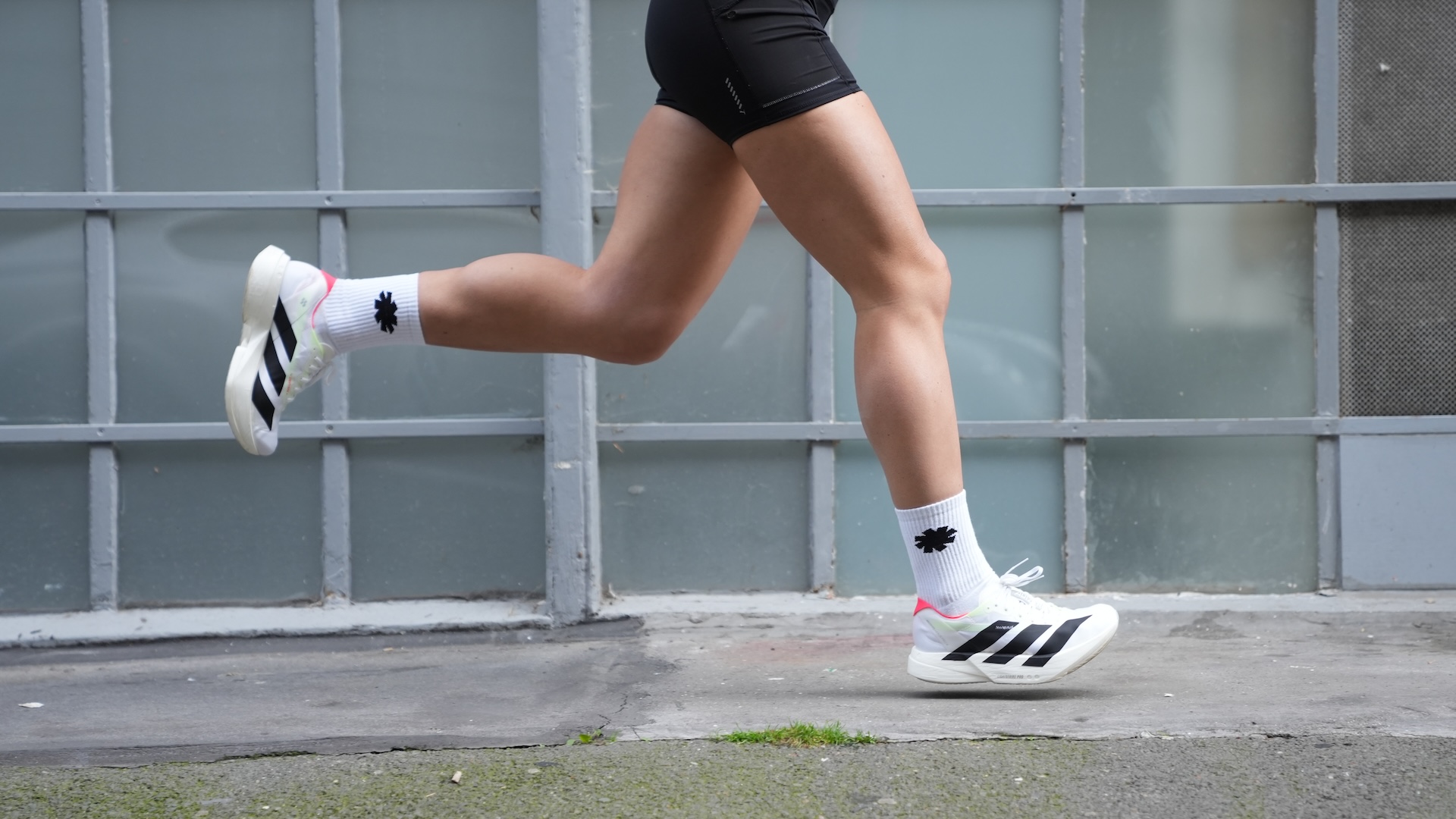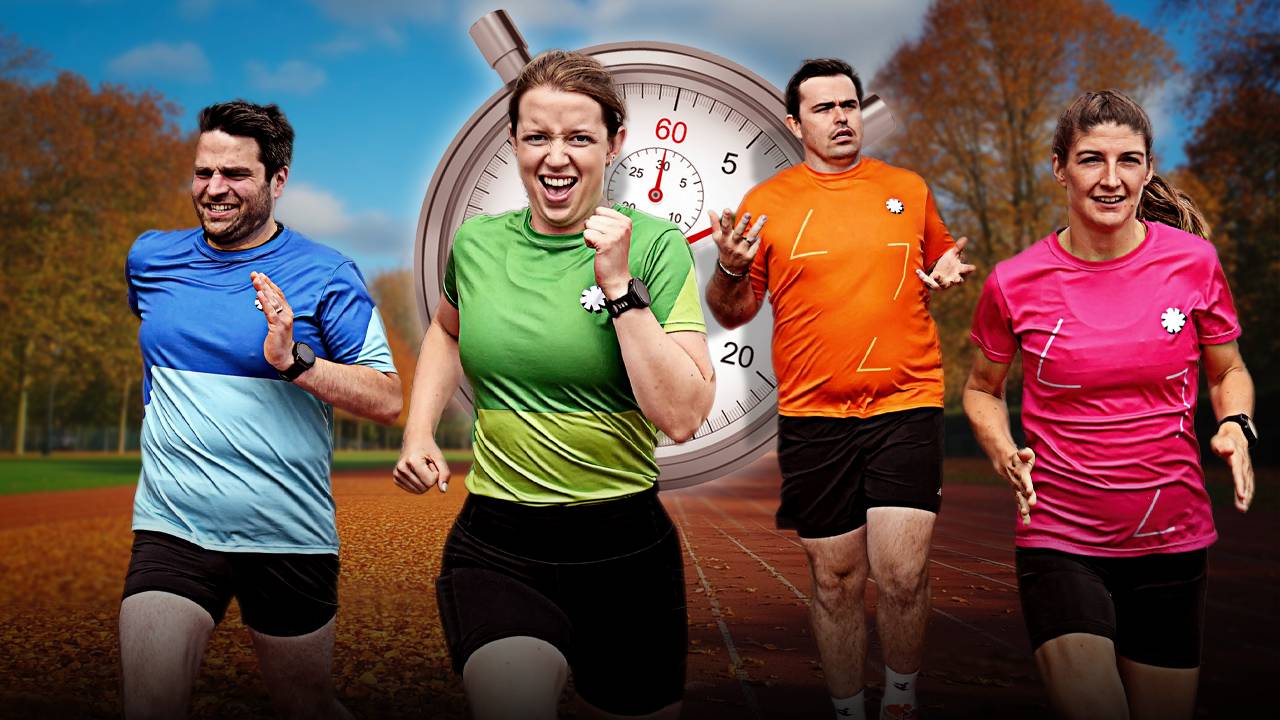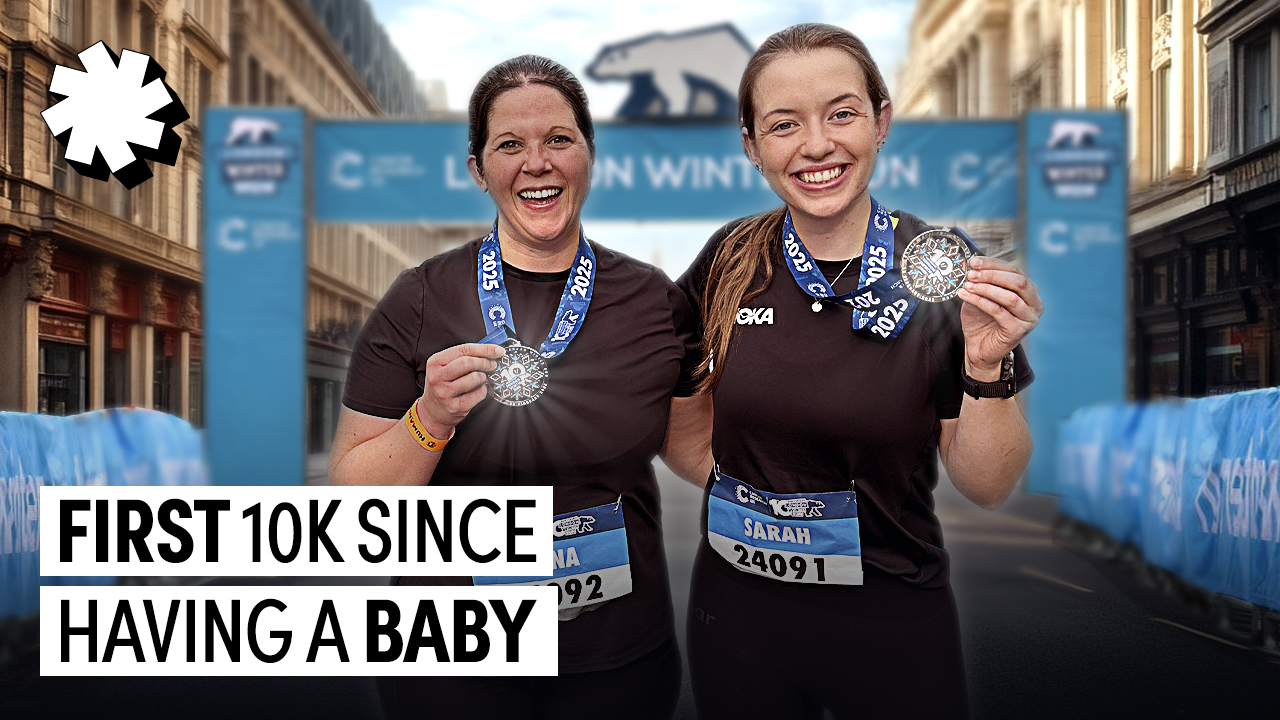Legal Performance Enhancers For Runners

Looking for a performance boost?
These are some of the things which have been widely researched and used over the years to help athletes find small gains in their performances. Will any of these make you a better runner? There’s only one way to find out…
In this guide to performance enhancers and supplements, we look at: carbon plate supershoes, altitude training, heat training, gym workouts, caffeine, beetroot, ketones, sodium bicarbonate, creatine monohydrate, beta-alanine, water, carbohydrates, and perhaps the most important of all, sleep. And we answer the question: What’s the best way to improve as a runner?
Carbon Plate Supershoes
The most prominent technology to boost performance in the past five years is the development of carbon plate supershoes. With super responsive foams, rigid curved carbon plates and incredibly light uppers, these have helped so many runners to get faster times.
Based on the research, supershoes could improve your running economy by more than 10%, but it’s important to find the right shoes for you as research suggests some shoes could decrease economy by more than 10%. There’s an average improvement of 2%-4% in running economy, which could be three-to-seven minutes over a three-hour marathon. Based on data, women have collectively benefited more from supershoes than men, particularly in longer distances.
The main drawback of supershoes is the cost. Most are now priced around £250/$300. That’s a lot of money for a shoe, especially one that you may only race in a couple of times. Is it worth the cost for a new PB? Looking at race start lines around the world, many runners think it is.
Altitude Training
When we think about illegal performance enhancers, one of the most common for endurance athletes is EPO, or erythropoietin, otherwise known as ‘blood doping’.
EPO is the main hormone which produces and regulates red blood cells, which transfer oxygen to the muscles. If you have more red blood cells then you can get more oxygen to the muscles and you have a higher exercise capacity, especially at long, hard efforts like a marathon.
Training at altitude also has the effect of increasing red blood cell count.
As there is less oxygen in the air at altitude, the body compensates by releasing more EPO and more red blood cells. If athletes live and train at high altitude (between 1,500m-2,500m / 5,000ft-8,000ft) they can naturally increase their red blood cell count, so that when they race at sea level they have a potential performance boost of 1-2%.
Is it worth moving to Eldoret in Kenya, Font Romeu in France or Flagstaff in Arizona for a couple of months before your next goal race? Probably not for most amateur runners, plus the extra strain on the body of training at altitude takes some getting used to, but it works for a lot of pros.
Heat Training
Sometimes known as ‘poor man’s altitude training’, once our body adapts to exercising in warm conditions it can give improvements in heart rate, core body temperature, sweat rate and perceived effort during exercise in the warm, which is a benefit which then transfers to cooler temperatures.
Basically, when we’re hot our heart rate increases for the same effort level, but we can adapt to heat over a couple of weeks and we become more efficient, especially around how we sweat.
Our sweat rate increases in the heat, and as that happens our body produces more blood plasma to transfer more water around the body and to the skin, while also generally increasing the blood flow. It’s not the same as altitude training or EPO, but it’s similar. Just remember that if you train in the heat it’s essential to always be fully replacing all fluids and electrolytes lost through sweating, or you’ll suffer from dehydration, which can decrease blood flow and be more detrimental to your performance (as we look at below).
Most benefits come from active heat training (i.e. running in a warm place) but can also be boosted by passive heat exposure (i.e. sauna).
Should you set up a treadmill in a sauna? Almost definitely not, but there could be some benefits to heat training. The best use of heat training would be for those who are racing somewhere hotter than where they live because runners are much more likely to DNF a race in the heat than the cold, so if you get adapted to the heat you may perform better on race day.
Gym Workouts
The performance enhancers in this feature aren’t intended to be short cuts to personal best. You can’t just add some novel supplements and suddenly get quicker, and you still need to do the hard work. For runners, that happens in the gym as well as on the tarmac or trails.
Getting stronger will improve your running performance. Strength training makes your muscles and tendon stronger and more resilient, which can help to improve your running form and economy and reduce injury risks.
Try to do one or two strength sessions per week, focusing on the key running muscles, including glutes, hamstrings, quads, calves and core.
Caffeine
Caffeine is one of the most researched substances for athletic performance. When we consume caffeine it blocks feelings of tiredness, and to a lesser extent it blocks pain signals, making us feel more alert and energised, and dulling the discomfort we feel during hard efforts.
Taking caffeine before and during exercise, via coffee, chews or gels, can improve performance, with the best results found in longer endurance events. Caffeine can also improve cognitive function, so it can help you to remain mentally focused as you get more tired in a race.
Is it worth trying caffeine? The research says that it is, just scale up the amount you use to find your tolerance level, especially if you are sensitive to caffeine. We’ve written a full guide to caffeine and runner here, including some guidelines on suggested amounts to try.
Beetroot
Taking a beetroot supplement, like Beet It Sport, can improve cardio efficiency, endurance and time to exhaustion, and may help to improve your VO2 Max.
Beetroot is high in nitric oxide, which can increase blood flow to muscles, as well as helping with the uptake of glucose in the muscles, and improving muscle contraction and relaxation. Based on the research, it seems to be particularly beneficial in the final stages of a longer race.
You can take beet shots in the days leading up to a race and on the morning of the event, but you should avoid brushing your teeth or using mouthwash after having a beet supplement as it can prevent an increase in nitric oxide.
Should you try beets? There aren’t many negatives to beetroot (unless you hate the flavour), and it can be an affordable supplement, especially if you tend to struggle late in races.
Ketones
One of the recent supplements to become more prominent in endurance athletes, ketones are naturally produced in the body as a form of energy, but to be able to make ketones we have to be depleted of carbohydrates, forcing the body to convert fat into ketones. That’s quite complicated, and takes a long time, so ketone esters have been developed and athletes take them in the form of a liquid or gel shot.
Ketones are used as a fuel source alongside muscle glycogen (so more overall energy availability), they may decrease lactate in muscles, could have cognitive benefits as the brain can use it as a fuel, and ketones may also help muscle recovery. Results seem to vary by users and it’s an expensive product to use regularly, but those who feel a benefit typically report a great boost from using ketones.
Sodium Bicarbonate
Sodium bicarbonate is one of the most-researched supplements and has been shown to improve muscle endurance, though for runners the best results so far have come for high-intensity efforts which last up to 12 minutes.
When you exercise at a hard intensity, or for a long time, your body naturally produces lactic acid, which separates into lactate and hydrogen ions. Those hydrogen ions lowers the pH in muscles, which makes it harder for muscles to contract, causing fatigue and a burning sensation. Sodium bicarbonate works by decreasing the acidity in muscles, allowing you to run harder before the fatigue slows you down.
Some people can experience stomach discomfort when taking sodium bicarb, so bear that in mind if you want to try it, and stick to the suggested doses (0.2-0.4g per kilo of body weight). Though honestly, this might only be a supplement for the elites looking for a tiny benefit.
Creatine Monohydrate
Creatine monohydrate is one of only a handful of supplements which are widely-agreed upon as having positive effects on exercise performance, based on thousands of different studies all confirming similar results.
Research into creatine monohydrate is particularly good for high-intensity runs and sprints, but there can be benefits for all types of runs as the body uses creatine stored in the muscles to generate energy. Creatine has been shown to increase time to exhaustion in exercise, can help increase muscle mass (and keep muscle mass in older runners), and help against muscle damage and soreness from hard runs or gym workouts.
Beta-Alanine
This non-essential amino acid has good research to suggest that it can buffer acidity in muscles, in a similar way to sodium bicarbonate. Most research suggests benefits of efforts up to four minutes, though this study put cyclists through a 110-minute ride followed by a time trial and sprint finish, and participants supplementing with beta-alanine had an average peak power output increase of 11.4%, so that could mean it helps runners finish strong in longer races.
Beta-alanine could be useful as a training supplement for runners, especially for improving exercise capacity in shorter threshold intervals. One common side-effect is a temporary sensation of tingling skin.
Water
We’re getting down to the fundamentals of performance now. The only way we can improve our performance is to be training consistently and effectively, and anything which sets that back can be detrimental. Being well-hydrated is essential as even minimal dehydration can make exercise feel harder.
When dehydrated, you have lower total blood volume, so less oxygen gets to your muscles. Your heart rate goes up, as does your body temperature because you sweat less, plus you’ll experience a reduction in mental sharpness.
Hydrate well, add electrolytes, drink often during exercise, especially long runs and on hot days, and rehydrate after you’ve finished.
Carbohydrates
If you limit the amount of carbohydrates you consume then you’re limiting the amount of potential energy you can readily use.
Go into any run under-fuelled and your performance will likely suffer, or it’ll at least feel harder. You may increase your injury risk because your body doesn’t have the energy it needs, and you won’t be able to perform the run in the best way.
You want to go into every run with enough energy. That could be as simple as a snack like a banana or energy chews, or might mean spending a couple of days carb-loading for a big race.
And then you need to refuel properly after a run. Take on carbs and protein to restore the energy you’ve used and to help your body recover to be able to run again soon.
Sleep
We’ve saved the most important to last, and of all the things that you can do to improve your performance, getting enough sleep is the most essential.
You can take every supplement you want, run 100 miles every week, have the fastest supershoes and the perfect diet, but if you don’t sleep then you won’t be able to recover and absorb the training.
During deep sleep our body releases hormones that repair and strengthen muscles, while also replenishing energy we’ve burned (kind of like putting ourselves on charge for the night), and reducing inflammation and stress responses.
A lack of sleep can affect our immune system, cognitive abilities and physical performance because our body isn’t able to properly rest and repair itself. Getting eight hours sleep a night is ideal for most people, while naps can also help after a disturbed sleep. Several studies have found performance benefits to sleeping 10 hours.
If you have a period of disturbed or reduced sleep, then you should consider reducing your training volume to avoid overreaching or overtraining.
What’s The Best Way To Improve As A Runner?
There’s no single magic ingredient which will make you improve as a runner.
The best thing you can do to become a better runner is to train consistently with gradual progress over weeks, months and years, where you slowly add more volume and intensity as you move through a training block, and from one training cycle to the next.
The only way to be consistent is to make sure we reduce our injury risk and improve the way we can recover from each run.
If we can run regularly and recover well by being hydrated, well fuelled and getting enough sleep, plus adding strength training and we get more resilient to the harder efforts, then that’s a great start. Everything beyond that – the shoes, the supplements, the training environments – may give us a small extra 1% here and there, but it’s all built on a foundation of consistent training.


























Running News
Will A Woman Run A Four-Minute Mile? Research Says It’s Possible
Tadese Takele And Sutume Asefa Kebede Win The 2025 Tokyo Marathon!
Boston Marathon 2025 Medal Reveal And Celebration Jacket